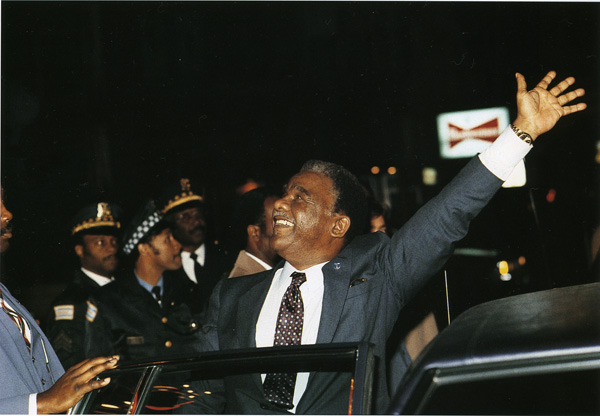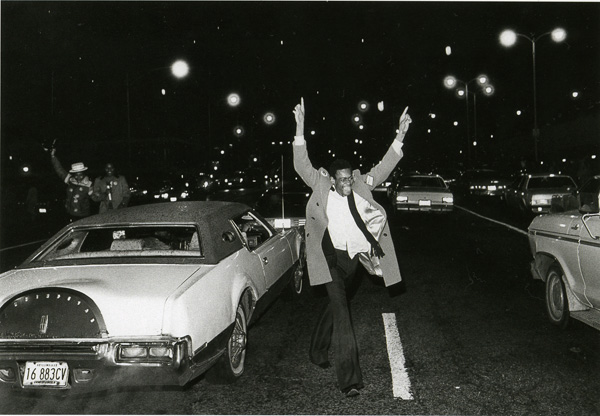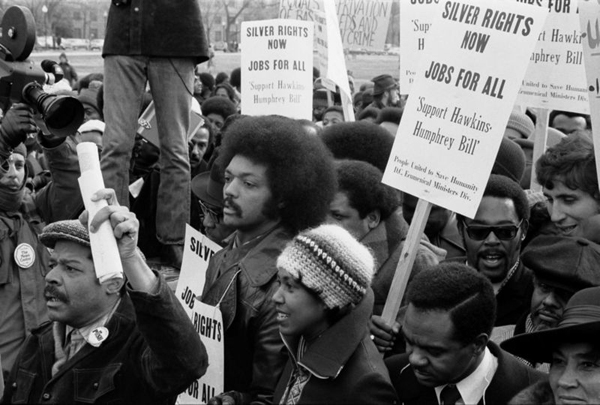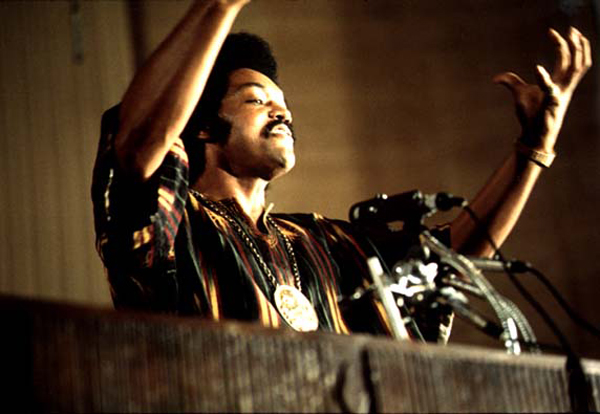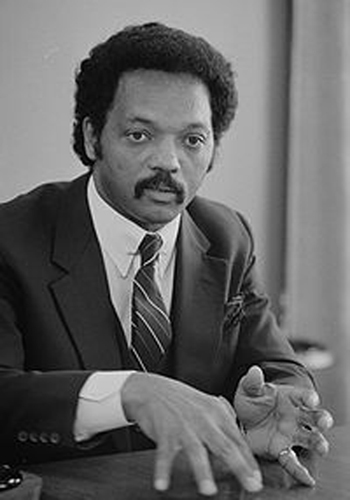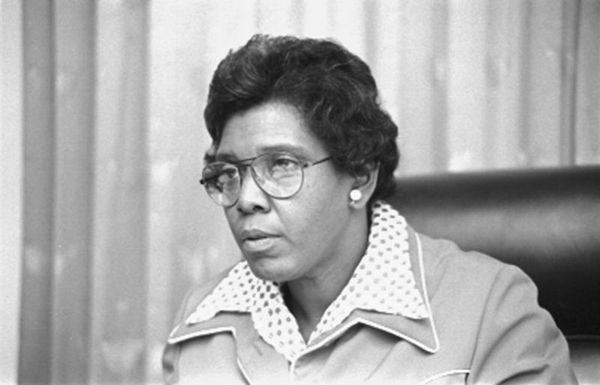SECTION 02
Black Politics
Despite these issues, for the thirty million African Americans who lived in the United States in the mid 1980s, the events that had transpired in the previous thirty-six years since the Brown v. Board of Education decision had significantly transformed American democracy. Only a generation before, blacks had been all but invisible in government; now they ran many of America’s major cities, held more than thirty congressional seats, and would soon hold more than ten thousand elective offices throughout the nation. The new black leadership in electoral politics would prove to be an important force in creating change in the lives of African Americans both locally and nationally.
Harold Washington was elected first African American mayor of Chicago on April 12, 1983.
Source: Brent Jones.
One of the most important figures in this new black leadership was Harold Washington. For more than fifty years the Cook County democratic machine controlled municipal government by manipulating votes and through the use of patronage and graft. Under Chicago political boss Mayor Richard Daley (from 1955 to 1976) the black community was severely disadvantaged: schools were under-funded and public services were unequally distributed. In 1980 a coalition of largely black community organizations convinced Congressman Washington to challenge the Democratic machine. After serving in both the Illinois state and U.S. senate, Washington forged an unprecedented coalition of blacks, Hispanics, labor, progressive whites, and other constituencies, sometimes referred to as a “rainbow coalition,” and, in a three-way race, Washington defeated incumbent mayor Jane Byrne, and Richard M. Daley, the son of the former mayor, to win the Democratic Party’s nomination. In the general election on 12 April 1983, Washington defeated Republican challenger Bernard Epton to become the first African American mayor of Chicago. As mayor, Washington tried to eliminate corruption; made city government more transparent, forged coalitions with neighborhood groups, expanded city services in minority neighborhoods, and restored the city’s financial health through a property tax increase. Reelected in 1987, Washington died of a heart attack on 25 November of that same year.
Jesse Jackson, Jan 15th, 1975.
Source: Library of Congress Prints and Photographs Division, Washington, DC., U.S. News & World Report Magazine Collection [LC-U9-30656B-10].
Jesse Jackson speaks from PUSH headquarters.
Source: National Archives and Records Administration.
Nonetheless, the advances made by politicians like Washington and organizations like the National Black Political Assembly, a coalition of black intellectuals, political leaders, and community activists that sought to put pressure on local and national politics to give priority to African American issues, set the stage for the 1984 Presidential campaign of Jesse Jackson. Becoming involved in the civil rights movement first through CORE, Jackson had joined the SCLC and soon became a protg of Martin Luther King, Jr. In the 1960s King assigned Jackson to develop a coalition that included black ministers, civil rights leaders, and corporations to create job opportunities for blacks in Chicago, which resulted in the SCLC ’s successful Operation Breadbasket. After King’s assassination, Jackson launched Operation PUSH (People United to Serve Humanity), which expanded upon the “corporate covenants” and other business-related partnerships that he had initiated in the SCLC.
Jesse Jackson speaking during an interview in July 1, 1983.
Source: Library of Congress Prints and Photographs Division, Washington, DC., U.S. News & World Report Magazine Collection [LC-U9-41583-29].
In 1983, Jackson announced his candidacy for the Democratic Party’s presidential nomination. Most black elected officials and prominent civil rights leaders, including Coretta Scott King and Andrew Young, opposed Jackson’s candidacy. However, he successfully built an interracial coalition similar to Harold Washington’s, which included blacks, Latinos, lesbians and gays, environmentalists, peace activists, progressives from organized labor, and many others. In 1984, Jackson lost the three-way Democratic primary to Walter F. Mondale, but his “rainbow coalition” won him 3.5 million popular votes, making him the first serious African American challenge for the presidential candidacy. During his campaign Jackson called for full employment, strong enforcement of affirmative action, environmental protection and women’s rights, and opposed the U.S. nuclear arms race with the Soviet Union. The campaign illustrated that a black presidential candidate running on a progressive program could successfully appeal across racial lines.
The success of Jackson’s 1984 presidential campaign created widespread support for his second effort to capture the nomination four years later. Jackson’s Rainbow Coalition called for federal initiatives to address unemployment, health, education, housing, and urban problems. The campaign mobilized an unprecedented interracial coalition and prompted hundreds of thousands of new black voters to register. Jackson received over seven million popular votes—from four million African Americans and an additional three million whites, Asians, and Hispanics—and won a series of primary contests, but lost the nomination to Massachusetts Governor Michael Dukakis, who was subsequently defeated in the general election by Republican candidate George Bush.
Jackson did not win the Democratic presidential nomination in either year, but his campaigns accomplished important goals: one million new black voters registered, and a stronger progressive political relationship developed between the black electorate and other minority groups, culminating in the subsequent elections of thousands of new minority officials in federal, state, and local races during the late 1980s and 1990s.
Related Resources
Barbara Jordan, 1976 member of the U.S. House of Representatives (D-Texas).
Source: Library of Congress Prints and Photographs Division, Washington, DC., U.S. News & World Report Magazine Collection [LC-U9-32512-12].
Harold Washington was elected first African American mayor of Chicago on April 12, 1983.
Harold Washington waving to the crowd on the night of his election as mayor of Chicago.
Source: Brent Jones.
Celebrating the inauguration of Harold Washington, 1983.
A man celebrating the inauguration of Harold Washington as mayor of Chicago, April 29, 1983.
Source: Brent Jones.
Jesse Jackson speaks from PUSH headquarters.
The Rev. Jesse Jackson speaks on a radio broadcast from the headquarters of Operation PUSH, [People United to Save Humanity] at its annual convention. July 1973.
Source: National Archives and Records Administration.
Jesse Jackson, Jan 15th, 1975.
Jesse Jackson surrounded by marchers carrying signs advocating support for the Hawkins-Humphrey Bill for full employment, near the White House, Washington, D.C.
Source: Library of Congress Prints and Photographs Division, Washington, DC., U.S. News & World Report Magazine Collection [LC-U9-30656B-10].
Jesse Jackson speaking during an interview in July 1, 1983.
When Jesse Jackson announced his candidacy in 1983, most established black elected officials opposed him.
Source: Library of Congress Prints and Photographs Division, Washington, DC., U.S. News & World Report Magazine Collection [LC-U9-41583-29].
Barbara Jordan Delivers Keynote Address at the 1976 Democratic Convention.
Barbara Jordan becomes the first woman and the first African American to give a keynote address at a Democratic National Convention. During her celebrated speech, she quotes Abraham Lincoln who said, "As I would not be a slave, so I would not be a master...." Source: NBC News / iCue.

